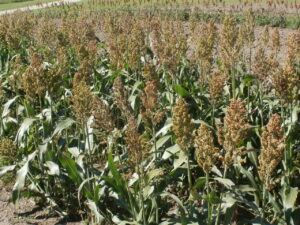Project Overview
Annual Reports
Information Products
Commodities
- Agronomic: sorghum (sweet)
Practices
- Production Systems: organic agriculture
Abstract:
University, NGO, and farmer partners in North Dakota evaluated a screen of 107 sorghum lines in an effort to identify the most promising lines for further evaluation. In 2016 we carried out replicated trials of twenty one lines, two check hybrids, and a mixed population on two organically managed university sites and on one organically managed farm. We also carried out two unreplicated trials on two additional organic farms. Farm animals damaged the planting at one of the farm sites, but we did get useful information from the other locations. Some promising lines appeared, but additional work is called for to clearly work out the potential for sorghum production in North Dakota. Going forward, our university partners will begin increasing the seeds of the best performing lines of sorghum for additional evaluation, potential production, and further breeding.
Introduction:
Sorghum is a warm seasoned grass that is grown in wide rows much like corn, which it outwardly resembles. Unlike corn, sorghum grains are carried in a single head at the top of the plant, and it is largely self-pollinated. It is lower yielding than corn in high production areas with plentiful rain, but in areas with limited rain and especially with higher temperatures, sorghum will often out yield corn. This makes sorghum a popular grain crop on the southern and central plains. It is also dry on the northern plains, but fewer growing degree days limit the use of most of the varieties that are grown further south. Also, nighttime temperatures below 50o F can interfere with pollen development and shedding, which can greatly limit production in a self-pollinated plant. These lower night temperatures are not unusual in parts of Minnesota, North Dakota, and Montana, so although sorghum seems like a useful crop in parts of this region, it has not proved dependable to date.
[caption id="attachment_374235" align="alignnone" width="300"] Sorghum bears its grain in a head at the top of the plant.[/caption]
Sorghum bears its grain in a head at the top of the plant.[/caption]
The grain of sorghum varies in size, color, and texture. Much of the grain grown is reddish to tan in color, although some is also white or white with splashes of red color. In recent years white grain has been sought after to fill the need for flour with no gluten. Many gluten-free products depend upon white sorghum flour, and the market demand appears to be growing rapidly.
Members of the Northern Plains Sustainable Agriculture Society’s Farm Breeding Club have experimented with some white sorghum accessions donated to FBC by retired plant breeder and ND native, Mat Kolding. A primary focus of Kolding’s sorghum breeding at Oregon State University was early maturing, cold-tolerant lines, grown in areas subject to nighttime temperatures of 45-50o F during flowering (Kolding, personal communication). These seemed like the lines needed to bring sorghum north and to simultaneously address the new gluten-free market for white-grained sorghum to assure good grain prices for new growers in the North.
FBC members, David Podoll and Steve Zwinger, screened 40 of Kolding’s 106 donated accessions, saving seed and documenting their performance and adaptability to ND growing conditions (funded in part by SARE: FNC10-828). Podoll created a bulk population of the white sorghum varieties that produced mature seed. In 2014 Podoll shared seed with FBC member, Owen Trangsrud, who planted 8 acres near Enderlin (Ransom County, ND). Our preliminary experiences provided proof of concept: these lines exhibit cold tolerance, early maturity, and growing potential for this region. We were able to save seeds readily. Additional evaluations of all the available lines in comparison with the earliest available hybrids, especially under organic management, were clearly needed in order to identify the most useful.
Project objectives:
Objective 1: Evaluate 107 sorghum lines with known cold-tolerance traits for adaptation and performance in North Dakota.
Objective 2: Identify sorghum accessions with marketable milling qualities paired with agronomic performance in northern tier states.
Objective 3: Demonstrate the agronomic and market feasibility of white sorghum as an alternative crop option for northern growers.
Objective 4: Disseminate variety trial data and project results to prospective growers and potential markets.
Objective 5: Obtain funding for two more years of replicated variety trials, identifying and providing farmers, processors and consumers with seed for the most desirable sorghum accession.